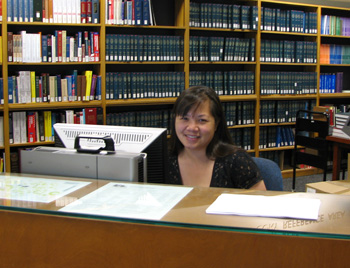 It didn’t take long for Berkeley Law reference librarian I-Wei Wang to boost her employer’s reputation. Less than a year and a half on the job, she has won the American Association of Law Libraries (AALL) Lexis/Nexis Call for Papers Award in the newer librarian division.
It didn’t take long for Berkeley Law reference librarian I-Wei Wang to boost her employer’s reputation. Less than a year and a half on the job, she has won the American Association of Law Libraries (AALL) Lexis/Nexis Call for Papers Award in the newer librarian division.
Wang will present her paper, entitled Schoolhouse Rock Is No Longer Enough: The Presidential Signing Statements Controversy and Its Implications for Library Professionals, at the AALL Annual Meeting in Portland this July.
“In 2006, when I was getting my Masters in library science at San Jose State, Congress and the media started paying a lot of attention to signing statements,” Wang says. “I did a research paper on the topic for class on public information. There was a resurgence of interest in this device, and the AALL competition spurred me to build on the work I’d done.”
Signing statements are official pronouncements issued by a president at or near the time a bill is signed into law. Used since the early 19th century, they can object to certain provisions of the law on constitutional grounds, state intent regarding how the president intends to execute the law, or include interpretation of the law’s language.
Although signing statements have no legal effect, their use increased dramatically during the Reagan Administration. President Bush has objected to over 700 provisions of law, often on the grounds they infringe on constitutional authority granted to the Executive Branch. Many legal commentators have criticized the rise in signing statements, arguing that they sometimes constitute line-item vetoes to which Congress cannot respond. Line-item vetoes were ruled unconstitutional by the Supreme Court in 1998.
Filling the Information Gap
Wang’s paper presents an overview of past controversies about signing statements, identifies informational and organizational gaps that make it hard to identify and locate them, and reviews their practical and policy implications. It also provides a detailed account of the current literature and debate surrounding the issue.
“You can’t just open up a book and see all the presidential signing statements,” Wang says. “There aren’t a lot of sources for finding out how many signing statements a president made, and who has used them in what ways. My approach examines the informational problem facing researchers looking for signing statements, and points to the resource options available to them.”
Wang grew up in Palo Alto, went to Harvard Law School and graduated in 1996 before returning to the Bay Area. She practiced law for seven years in San Francisco, first specializing in securities litigation for a large corporate firm and later working for a mid-size firm in general commercial litigation.
“What I liked most were the analytical challenges, taking a problem-solving approach, and doing substantive research connected to that,” Wang says. “I finally put it all together that I could have all those things doing legal librarianship. It’s an incredibly lucky coincidence that the Law Library was looking for someone just as I was winding up grad school. The school has a world-class research collection, an internationally renowned library staff, and an incredible community of students, faculty and staff. I literally could not have asked for more in a job.”
— By Andrew Cohen